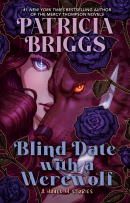
Roses in Winter
Excerpt
Asil smelled the intruder as soon as he opened the door of his greenhouse, but he made no sign of it.
Kara Beckworth was the Marrok’s current puzzle. She’d been attacked when she was only ten and was the youngest survivor either Asil or Bran had ever heard of—and between them they covered a lot of years. Her parents had done the best they could, but their only source of information was from a half-mad, antisocial lone wolf whose greatest skill was that he never did anything to attract the Marrok’s attention, so he could be left to live his life in peace.
He’d told Kara’s parents they should let him kill her. When they’d refused, he’d told them to keep her away from other werewolves. So every full moon, her parents had kept her locked in a cage and, when she’d reacted as most young things who had been locked in a cage would react, decided that werewolves had no control of themselves. Before she could prove them right, or succeed in killing herself—something she hadn’t had enough knowledge to accomplish—her father had used his skills as a reporter to find more useful help. Eventually, that had landed Kara and her father here in Aspen Creek, Montana.
Asil turned on the water and began to dampen his tomato starts as he considered his response to the intrusion. Most of the greenhouse was on drip lines, but he preferred to do some of the work himself—and he’d learned that repairing a drip line was nearly as time-consuming as watering it all himself anyway and considerably less satisfactory. The temptation in this age was to automate too much and ruin his own fun.
“I know you know I’m here,” Kara said defensively.
“Good,” he said without looking up from what he was doing. “I would hate to think you were stupid.”
“I should be in school,” she said, a little more aggressively.
Full moon in two days, close enough to make her restless, is what he thought. Hard to sit in a classroom with the moon singing in your veins, especially when she was so young. But he wasn’t subversive enough, quite, to tell her that.
“So why are you here instead?” He kept his eyes on his plants—which were only barely sprouts. They had a while to go before they would be plants.
““I like greenhouses,” she said.
Ah—not a lie. Refreshing in a child of, what? Twelve or thirteen, he thought.
“And no one would look for me here.” There was a little pause. “I am sorry for trespassing.”
He heaved a sigh and turned off the switch at the business end of the hose, which would temporarily shut down the water. “And I am sorry I am a responsible adult—at least today. I must insist we telephone whoever is watching out for you so that they do not worry.”
He looked at her for the first time. She was scrunched in the corner of the building, sitting on an upended five-gallon bucket. She was bundled up in one of those jackets that made everyone look like marshmallows even though the temperature was still fairly mild for early fall in Montana. He had not bothered with a coat when he headed out of his house. Her arms were wrapped mutinously around herself, so maybe the marshmallow effect was for something other than warmth. She’d been staring at him until he looked at her, but she couldn’t hold his gaze and shrank back farther in the corner.
“Do you know who I am?” he asked, curious. He was pretty sure that the Marrok, their Alpha, warned all the youngsters away from the big bad wolf.
She nodded. “You’re Asil. You’re the black wolf I saw on the last hunt. I can smell it.”
It had not been a moon hunt, those he no longer allowed himself; if the moon’s song was disturbing to those who were young, it dug in deep to those who were as old as he was. But he’d participated in the last training hunt, a few weeks ago. He was dark brown, not black, but he allowed that at night the difference was subtle, so he decided to let it pass.
She’d known nothing about being a werewolf when she’d come to Aspen Creek two months ago. She was learning to use her nose. She was also afraid of him, which normally he wouldn’t mind. But he didn’t like scaring children.



